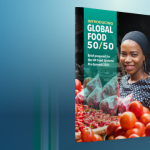Understanding the public health implications of food policies is crucial to combat recently increasing overweight and obesity rates in many low-and-middle income countries (LMICs). This study examines the implication of food policies, mainly tariff rates on “unhealthy” foods (sugar and confectionery products as well as fats and oils) and governments’ subsidies, on individuals’ body weight outcomes
New Global Food 50/50 Initiative Provides Data to Address Gender Gap
Read press release and brief
NEW PUBLICATION: 2020 Annual Report
IFPRI’s 2020 Annual Report presents highlights from our research work around the world. Cutting-edge research on the impacts of the COVID-19 pandemic and related policies, and on our strategic research areas—climate resilience and sustainability, healthy diets and nutrition, inclusive and [...]
The human face of urban food systems
Marie Ruel, IFPRI
Today, half the world’s population lives in cities. That share will jump to two-thirds by 2050, with much of the growth occurring in Africa and Asia. Given the pace and scale of urbanization, combined with global pressures on food systems such as climate change, a number of initiatives have emerged in recent years to help the world’s cities build sustainable and resilient food systems.
Ending undernutrition requires a different focus on stunting
Jef Leroy, Senior Research Fellow, IFPRI
Anyone following international development is probably familiar with “stunting”—which in nontechnical terms means children being too short for their age. Over the past decade, as the world has focused unprecedented attention on undernutrition, stunting has taken center stage.





